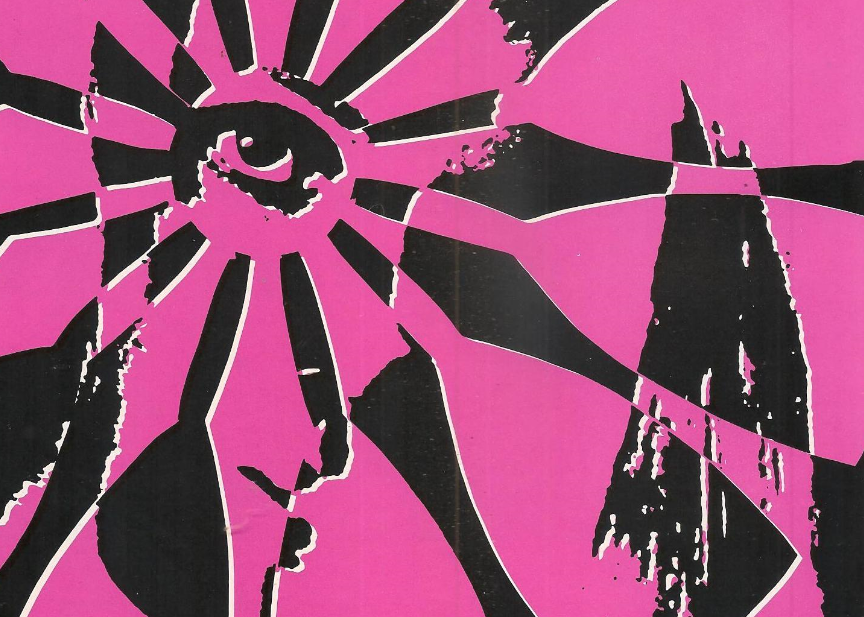 |
| The artwork for this story has that distinct "psychedelic" look. |
NOTE: This article continues my coverage of Angora Fever: The Collected Short Stories of Edward D. Wood, Jr. (BearManor Bare, 2019).
 |
| A poster for Glen or Glenda. |
The story: "Spokes of the Wheel," originally published in Swap (1971). Credited to "Dick Trent."
Synopsis: Ronnie is an androgynous young man who secretly dresses in drag and dreams of becoming a woman through surgery. He allows the other boys in school to use him like a woman. His widowed mother wants him either to go to college or get a job and become "all man," so Ronnie packs a suitcase and moves to the big city. There, he is almost immediately taken in by a psychotic crook named Carney, who turns him into a prostitute and abuses him. After many months, Ronnie finally escapes Carney and travels from city to city and even has a sex change operation in Mexico. But once Ronnie becomes a woman, she finds she is not accepted by mainstream society and falls back into a life of prostitution. Years pass, and then Ronnie is confronted by a figure from her past.
Wood trademarks: A great many from Glen or Glenda, including sex changes and how they're nothing "new"; hormone injections; male character borrowing clothing from his sister; a man with a feminine physique; soft materials such as angora and nylon; parents encouraging their son to play sports to make him manlier; character with an androgynous first name; the expression "behind locked doors"; "sweaters and skirts"; "nighties and negligees"; and a patient being symbolically "born" on an operating table. We also have a character forced into prostitution (cf. "The Hooker"); the term "boobies" (cf. "Bums Rush Terror," "Out of the Fog"); reference to throats being slashed in an alley (cf. "Bums Rush Terror"); and cocktail lounges (cf. The Cocktail Hostesses, many stories in Angora Fever). Additionally, the detail of Ronnie going to Mexico for a sex change may have been inspired by Ed's friend, John "Bunny" Breckinridge, who planned to do the same but didn't go through with it.
Excerpt: "He imagined himself to be a woman. And he was being taken from the front. After all, he did want to be a woman. And that was the way they took it. Of course they had a vagina and he only had that other. But one day that all would change. The only other thing he wished is that he wasn't naked. Perhaps later after the sex change he wouldn't mind being naked… he'd have the right kind of body."
Reflections: "Spokes of the Wheel" shows just how much Ed Wood changed between 1953, when he made Glen or Glenda, and 1971, when he wrote this story for publisher Bernie Bloom. While Glenda and "Spokes" include many common elements and themes, these two works are tonal opposites. When compared side-by-side, they show how Eddie's spirit had curdled over the course of 18 additional years in Los Angeles.
Glenda is optimistic and encouraging. Glen may like dressing as a woman, and Alan may want to become a woman, but all they really need is some love and understanding from society, plus some proper guidance from a medical professional. They, too, can become healthy, functioning members of American society. "Love is the only answer," declares Dr. Alton. In certain passages, Glenda has the chipper, can-do tone of an old high school civics film.
"Spokes of the Wheel," on the other hand, is bleak and despairing. This story argues that an individual like Ronnie who doesn't conform to gender norms will never be accepted by mainstream society and is doomed to be used and abused by creeps for decades. I assume Ronnie will die an early death, his family having given up on him years ago. This is an ugly story, and I can only speculate that Eddie was in a foul mood when he wrote it.
By the way, I can find no evidence of there being any popular saying about the spokes of a wheel always returning to the same place. Maybe this was a Poughkeepsie thing that never made it to the rest of the country?
Next: "Never Up—Never In!" (1971)
